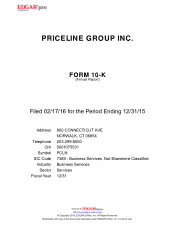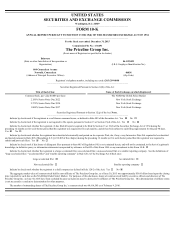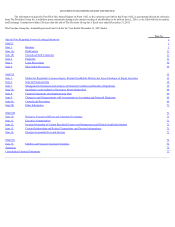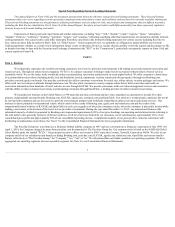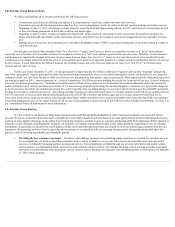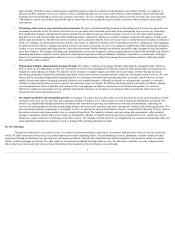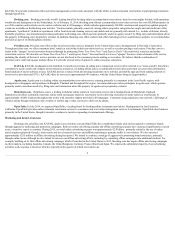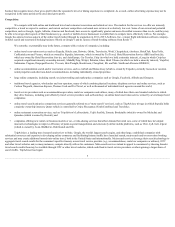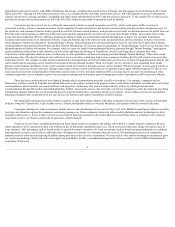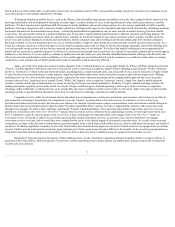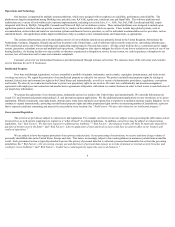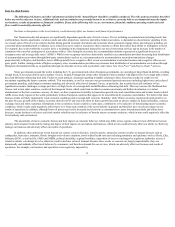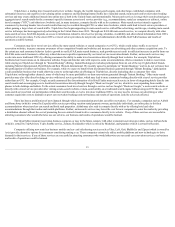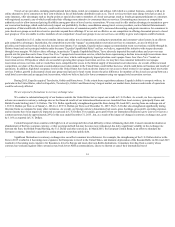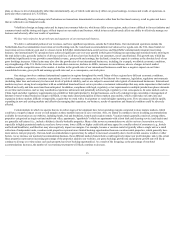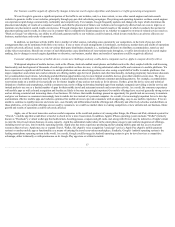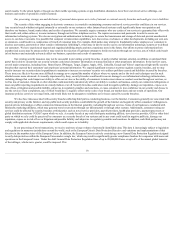Priceline 2015 Annual Report Download - page 11
Download and view the complete annual report
Please find page 11 of the 2015 Priceline annual report below. You can navigate through the pages in the report by either clicking on the pages listed below, or by using the keyword search tool below to find specific information within the annual report.
Operations and Technology
Our business is supported by multiple systems platforms, which were designed with an emphasis on scalability, performance and reliability. The
platforms are largely independent among Booking.com, priceline.com, KAYAK, agoda.com, rentalcars.com and OpenTable. The software platforms and
architecture use a variety of tools within each corporate implementation, including server-side Java, C++, ASP, .Net, Perl, PHP, JavaScript and SQL scripts
integrated with Oracle, MySQL, MongoDB, Cassandra and Microsoft SQL-server database systems. These internal platforms were designed to include open
application protocol interfaces that can provide connectivity to vendors in the industries in which we operate. These include large global systems, such as
accommodation, airline ticket and rental car reservation systems and financial service providers, as well as individual accommodation service providers, such as
individual hotels. Our applications utilize digital certificates to help us conduct secure communications and transactions, as appropriate.
The systems infrastructure and web and database servers of our worldwide operations are primarily hosted in the United Kingdom, Switzerland, the
Netherlands, Germany, Singapore, Hong Kong and four locations in the United States, each of which provides network connectivity, networking infrastructure,
UPS conditioned power and 24-hour monitoring and engineering support typical of hosted data centers. All data center facilities have a continuous power supply
system, generators, redundant servers and multiple back-up systems. Although we take steps to mitigate the effects of any loss or reduction in service at one of our
hosting facilities, if a hosting facility were inaccessible or otherwise experienced a disruption in service for any reason, we could experience a disruption to our
services, loss of transactions and revenue and consumer complaints.
Customer service for our international business is provided primarily through in-house call centers. We outsource most of the call center and customer
service functions for our U.S. businesses.
Intellectual Property
Over time and through acquisitions, we have assembled a portfolio of patents, trademarks, service marks, copyrights, domain names, and trade secrets
covering our services. We regard the protection of our intellectual property as critical to our success. We protect our intellectual property rights by relying on
national, federal, state and common law rights in the United States and internationally, as well as a variety of administrative procedures, regulations, conventions
and treaties. We also rely on contractual restrictions to protect our proprietary rights in our services. We enter into confidentiality and invention assignment
agreements with employees and contractors and nondisclosure agreements with parties with whom we conduct business in order to limit access to and disclosure of
our proprietary information.
We pursue the registration of our domain names, trademarks and service marks in the United States and internationally. We currently hold numerous
issued U.S. and international patents and pending U.S. and international patent applications. We file additional patent applications on new inventions, as we deem
appropriate. Effective trademark, copyright, patent, domain name, trade dress and trade secret protection is expensive to maintain and may require litigation. As we
continue to expand internationally, protecting our intellectual property rights and other proprietary rights involves an increasing number of jurisdictions, a process
that is expensive and time consuming and may not be successful in every location. See " Risk Factors - We face risks related to our intellectual property ."
Governmental Regulation
The services we provide are subject to various laws and regulations. For example, our travel services are subject to laws governing the offer and/or sale of
travel services as well as laws requiring us to register as a "seller of travel" in certain jurisdictions. In addition, our services may be subject to various taxing
regulations. See " Risk Factors - We may have exposure to additional tax liabilities, " " Risk Factors - Our financial results will likely be materially impacted by
payment of income taxes in the future " and " Risk Factors - Adverse application of state and local tax laws could have an adverse effect on our business and
results of operations. "
We are subject to laws that require protection of user privacy and user data. In our processing of reservations, we receive and store a large volume of
personally identifiable data in the United States, Europe and Asia. This data is increasingly subject to laws and regulations in numerous jurisdictions around the
world. Such government action is typically intended to protect the privacy of personal data that is collected, processed and transmitted in or from the governing
jurisdiction. See " Risk Factors - Our processing, storage, use and disclosure of personal data exposes us to risks of internal or external security breaches and
could give rise to liabilities " and " Risk Factors - 'Cookie' laws could negatively impact the way we do business. "
8

